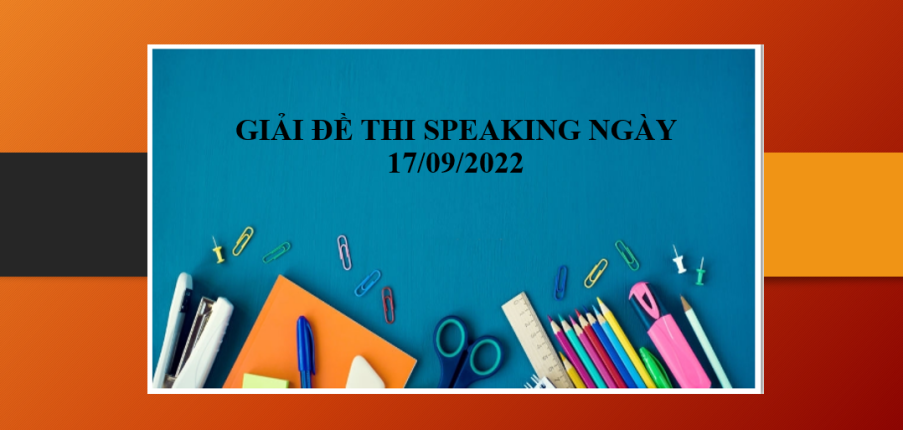Giải đề thi Speaking ngày 17/09/2022 | Part 1: Haircut - Part 2: Describe an important letter or email you wrote - Part 3: Emails
IELTS Speaking Part 1: Haircut
1. Have you ever had an unhappy haircut experience?
Yes, and it happened so unexpectedly. During the previous covid-19 lockdown, my hair was growing too long, so I borrowed a hair shaver from my father and gave myself a haircut. It was a disaster since I had no experience.
- Unexpectedly (adv): một cách bất ngờ
- Disaster (n): thảm họa
2. How long have you had your current haircut?
Beside the “accident” I’ve just mentioned, I’ve had this haircut virtually all my life, ever since I could remember. Despite not being fashionable, it’s comfortable in a hot and humid country like Vietnam.
3. Would you like to change the colour of your hair?
I don’t feel like changing it now. But who knows, maybe I’ll be more open about it in the future.
Bài mẫu IELTS Speaking Part 2: Describe an important letter or email you wrote.
Đề bài
You should say:
- who you wrote to
- when you wrote it
- what you wrote
And explain why you wrote that letter.
Bài mẫu
I’m going to talk about the email I wrote to my Maths professor to request my final exam to be rescheduled.
It was an extremely important exam that I studied day and night for. Unfortunately, on the exam day, my mom was involved in a traffic accident, and I had to hurriedly get to the hospital to take care of her.
When the doctor informed me that her condition was good. I was relieved but suddenly realised that it had passed the exam time. Frantically, I pulled out my cell phone and began typing an email. I was feeling anxious and helpless about the situation. My professor was well-known for being strict about time and deadlines. I didn’t know what to write to make her understand my situation. Ultimately, I decided it was best to tell the truth.
I started the email with a formal opening: “Dear professor,”. Then I introduced myself and which course I was in. Next, I went straight to the issue. I explained that my mom was hospitalised suddenly, and I had to be there for her. As politely as I could, I asked about the possibility of taking another exam. After sending the email, I waited anxiously for the reply. To my surprise, not only did my professor allow me to reschedule my final exam, but she also gave me a week to be by my mother’s side.
The email I wrote eventually became my “life saver” and I’m so glad that I communicated with my professor immediately.
Từ vựng
- To reschedule (v): dời lịch
- Anxious (adj): bồn chồn, lo lắng
- Helpless (adj): tuyệt vọng
- To be hospitalised (passive, v): nhập viện
- To my surprise: thật ngạc nhiên là …(= Surprisingly)
IELTS Speaking Part 3: Emails
1. What kinds of people use emails often?
Off the top of my mind, I can think of human resource officers of companies, and of course, students are among people who have to send and receive email every day. I am a college student myself and I send emails to my professor asking about homework and to my classmates when I have group projects. I have also recently started working as an intern for a company and I have observed that the HR departments send out emails about important information such as promotion, holidays and company social activities almost every day.
- Intern (n): thực tập sinh
- To observe (v): quan sát
- Promotion (n): sự thăng chức
2. What are the advantages and disadvantages of emails, compared to handwritten letters?
Emails have a number of upsides over traditional letters. First and most important, you can send an email instantly making the communication with others so much faster. It’s suitable for businesses. Another advantage that makes emails suitable for businesses is you can send the same email to many people. Also, emails are always legible, and receivers do not have to struggle with bad handwriting. It’s so relieving to me.
However, emails generally are viewed as robotic and lack the personal touch. For this reason, they cannot replace handwritten letters as thank you notes or love letters. However, emails generally are viewed as robotic and lack the personal touch. For this reason, they cannot replace handwritten letters as thank you notes or love letters.
- Upside (n): mặt tốt
- Legible (adj): (miêu tả dòng chữ, chữ viết) rõ ràng dễ đọc
3. What effects, if any, do you think the use of emails might have on traditional culture?
Well, this is rather a difficult question! I’ve never thought about the impact that emails have on our culture. I suppose the days of waiting for the postman to deliver letters from your loved ones who live far away are gone. Even important documents such as university acceptance letters and job offers can be sent through emails nowadays. It makes waiting a little less stressful.
4. Do you think writing emails has strengthened or weakened people’s writing skills?
I think writing an email requires a different skill set and etiquette than writing an essay or writing a handwritten letter. To me, writing emails is about communicating efficiently in a few lines of words. So, writing emails can certainly improve and diversify one’s writing skills.
- Etiquette (n): cung cách, phép tắc
- To diversify (v): làm đa dạng
Xem thêm các tài liệu Tiếng Anh hay, chi tiết khác:
TOP Việc làm "HOT" dành cho sinh viên:



